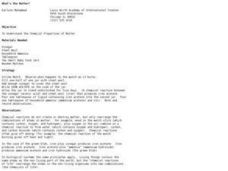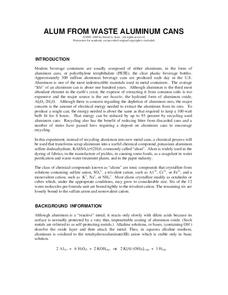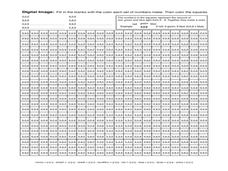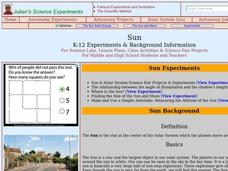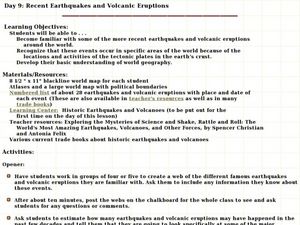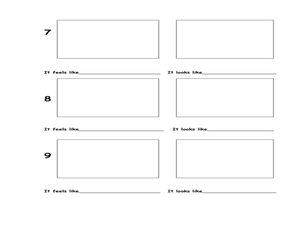Forest Foundation
Forest Watersheds
Where does the water we use come from? To understand the concept of a watershed, class members study the water cycle and then engage in an activity that simulates a watershed.
Curated OER
Thirsty Rocks: Please "Porous" a Drink!
A simple activity goes a long way in demonstrating the property of porosity to your rock hounds. They will mass a specimen of dry sandstone and then soak it in a pre-measured amount of water. After seven minutes, they once again measure...
Curated OER
What's the Matter? (Living and Non-Living Things)
Understand how chemical reactions recombine atoms to create the "chemicals of life". An experiment, showing the basic chemical reactions of an iron nail or a match, helps young children start their understanding of permanent changes.
Curated OER
Physical Changes and States of Matter - Two
Here's a wonderful lesson on how substances change states. Groups of learners are given trays with a chocolate bar, a piece of paper, an ice cube, and a balloon. During the activity, the groups closely observe the changes that each...
Wilderness Classroom
Pollution
Educate scholars on pollution—air, water, and land—with a series of lessons that begin with a thorough explanation of each type. Learners then take part in three activities to reinforce the importance of reducing pollution. They...
Curated OER
Coal Derivatives by Destructive Distillation
Chemists use the destructive distillation technique to produce three derivatives from a sample of bituminous coal. You will find background information, a materials list, procedures, and sample follow-up questions that you can use in...
Curated OER
Winter Wonderland - Winter Olympics and the Water Cycle
After a concise introduction to the water cycle, junior meteorologists access NOAA's average snowfall data. They choose a city to examine in terms of precipitation. Then they look at historical snowfall data and use it to predict snow...
Chymist
Alum from Waste Aluminum Cans
Turn aluminum cans into pickles! An engaging experiment has learners chemically change aluminum into a substance with many purposes including the manufacture of pickles. After performing the chemical conversion, the experimenters verify...
Curated OER
Imagers: The Adventure of Echo the Bat Number to Pictures: How Satellite Images are Created
Young scholars examine the three primary colors of light and design a numerical code to represent those colors. They tell how satellites use numbers to create satellite images after completing a number of experimental activities.
Curated OER
Paper Plate Sunflowers
A great way to recall the parts of a flower is to make one. Little learners create sunflowers out of paint and paper plates. They also discuss and label the various parts of their flowers.
Curated OER
Watercolor Rainbows
Who doesn't love a rainbow? Little ones adore them, so why not make rainbows the subject of your next art project. Your class can use watercolor to paint rainbows. As they do, have them identify the colors in the rainbow, talk about how...
Curated OER
Reduce, Reuse, Recycle and Respect
Second graders study the vocabulary that is associated with recycling and tell what recycling is. In this recycling lesson, 2nd graders use flash cards and Concentration type games to learn the vocabulary associated with recycling. They...
Curated OER
Biggest Trees in the United States
Students use the Internet (or printed sources) to locate information. They fill in missing information on a graphic organizer (chart) and use the data to answer questions. The research skills help students to develop higher order...
Curated OER
Sun
Learners study how the sun is at the center of the solar system. In this solar lesson students measure the altitude of the sun and its size.
Curated OER
Recent Earthquakes and Volcanic Eruptions
Students study the recent earthquakes and volcanic eruptions. In this recent earthquakes activity students complete an activity while working in groups.
Curated OER
Weather and Wind
Students study wind and its effect on weather. For this investigative lesson students write a report on wind and weather and create a movement sequence.
Curated OER
King of the Mound
Students investigate water as an agent of change. They conduct an experiment involving a mound of soil, observe and record any changes that occur when ice melts on the mound of dirt, and create a drawing of the changes that take place...
Curated OER
Glaciers
Seventh graders summarize how Earth processes today are similar to those that occurred in the past, and explain how slow geologic processes have large cumulative effects over long periods of time.
Curated OER
Exploring Marine Objects
Learners identify the sources of water on Earth. In this life science lesson, students list the different plants and animals that live in the ocean. They explore marine objects in the lab and draw them.
Curated OER
What Makes the Wind Blow?
Student study the properties of wind. They make a miniature hot-air balloon and compose diamond-shaped poems about the wind. They explain that as the sun warms air around the earth, the air rises. Colder air then moves in to fill the...
Curated OER
What Should I Wear Today?
Fourth graders examine weather data for Columbus, Ohio using an Internet resource. They complete a two day and a weekly weather charts before discussing the information. After the discussion, they answer questions about the charts...
Curated OER
Can Worms See?
Second graders discuss the previously created worm compost and the importance of living creatures to the Environment. In this worm lesson, 2nd graders observe worms and record their sensitivity to light. Students design a petri dish...
Michigan Sea Grant
Environmental Decision Making
Pupils participate in a board game activity in which landing on a space called "Decision Card" presents them with a land-use situation to consider and decide how to act. In order to advance in Hydropoly, players must think critically and...
Other popular searches
- Science Earth Day Activities
- Science Earth Day Lessons
- Earth Day Science
- Earth Day Science Projects
- Earth Day Science Lesson Plans
- Earth Science Earth Day




